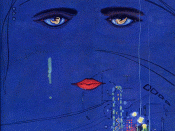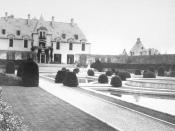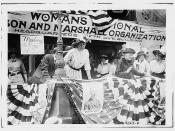The illusions that the characters thrive their relationship upon in The Great Gatsby cause its destructive nature. The characters Nick, Myrtle, and Gatsby's unconsciousness of reality and intense desire to fulfill their own dreams show this concept. Those illusions that ultimately diminish are, to a large extent, the trigger to the demise of their relationships.
Although Nick describes himself as one of the few honest people that he knows, the collapse of his relationship with the deceitful Jordan Baker is due to his delusion of believing he cares for her. When Nick meets Jordan, he remembers a rumor that she had cheated on her first gold tournament. He is completely aware that she is careless and "incurably dishonest"ÃÂ (58), yet he is still attracted to her nevertheless. Nick's impression of the "racy"ÃÂ and "adventurous feel"ÃÂ (57) of New York, the place he escaped to after returning restless from the war, is what Jordan represents to him.
Jordan's image, beauty, as well as Daisy's encouragement and the newfound lifestyle the surrounds Nick, convinces him that he likes Jordan and "for a moment [he] thought [he] loved her."ÃÂ(59) However, the illusion undoubtedly fades the night of Myrtles' death, when it no longer becomes oblivious to Nick of the uncaring, and immoral character that Jordan is. "I'm thirty, I'm five years too old to lie to myself and call it honor,"ÃÂ(168) he says to Jordan after his realization. As reality becomes clear, the relationship abruptly ends.
Driven by her passion to be glamorously rich and a part of society's elite, Myrtles' desire to be with Tom is only maintained by this fantasy. Her false belief of her love for tom is nothing but a zeal for his status and wealth. This insincere love is shown when the first words she speaks to toms when she gets off the train is, "I want to get one of those dogs."ÃÂ(29) Myrtle disregards the broken nose she receives by Tom's fist, and accepts his weak excuse for not leaving his wife. She needs Tom only to buy her clothes, status, and class, which she doesn't have living with her husband in an old garage in the poor side of town. The relationship would not have survived solely on the erroneous misconception of love.
Lastly, the destruction of Gatsby's affair with Daisy is the result of the radical illusion that she symbolizes to him. Daisy is exactly everything he had ever wanted to have, to be: class, money status, she is the epitome of the person and name, "Jay Gatsby"ÃÂ. She was "safe and proud above the hot struggles of the poor,"ÃÂ (142) which James Gatz had humiliatedly experienced working at Oxford as a janitor. Their relationship began on false perception that Gatsby lead similar wealthy lifestyle like Daisy's. With his tremendous illusion, he could find no flaw with Daisy nor could he realize, or want or realize when his dream was crumbling before him. "There must have been moments,"ÃÂ Nick had said concerning Gatsby, "even that afternoon when Daisy tumbled short of his dreams-not through her own fault but because of the colossal vitality of his illusion."ÃÂ (92) Gatsby's entire existence was to be with Daisy so that his dream that she signifies would not die. Even in the end when it is evidently obvious that Daisy will not continues her affair with Gatsby, he refuses to acknowledge it. To keep his dream alive he protects Daisy by pretending that he was the one who killed Myrtle, which ultimately leads to his own death. Gatsby's great illusion of his love for Daisy causes the inevitable demise of their relationship.
In time, the illusions of people and feelings will fade away along with the relationship, which they are built on. The characters in the book created unreal beliefs about themselves and their relationships to satisfy their own desires and ambitions. However these illusions, like the green light, are just wishful hopes and will in time, whether it is overnight or over a year, will eventually vanish.





